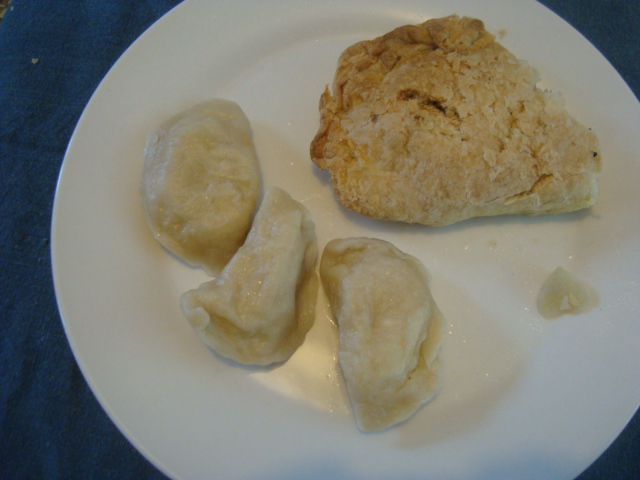2019 Day 358
Dedh
Trei Hans Etek ha Dogens
De
Meurth, pajwora warn ügens
mis Kevardhû
Tuesday,
24th December
Lôwen
o vy hedhyw! Na veu othom dhebm a fittya boos veth. Ow gour a wras
cofednow heb kig rag li hag o godhydh dhort Poloyn a fittyas kidnyow.
Gool Nadelik ew dedh specyal en Poloyn ha ma meur a voos specyal. Ma
mesk-radnow pecar en hogednow ha “pierogi” - ma toos ha tettys –
saw pebys ew an eyl en forn pecar'a tesen ha bryjys ew y gila en
padel pecar'a pasta. Shap kehaval ens, saw mens deffrans. “Uszkami”
ew bryjys ewedh, bes ma scavellow cronek gwils ettans en le tettys,
ha debrys o anjei gen cowl bettys (“barszcz”). En gordhûher
nei a gerras (gerdhas) dhe Melinjy dhe weles an golowow Nadelik ha
cana curlys Nadelik. Nadelik lôwen
dhe bub onan.
I
am happy today! I didn't have to prepare any food. My husband made
vegetarian pasties for lunch and my Polish daughter-in-law cooked
dinner. Christmas Eve is a special day in Poland and there is lots of
special food. There are similar ingredients in pasties and “pierogi”
- there is dough and potatoes - but one is baked in an oven like a
cake and the other is boiled in a saucepan
like
pasta. They are the same shape, but a different size. ”Uszkami”
are boiled as well, but there is wild mushroom in them instead of
potato, and they are eaten with beetroot soup (“barszcz”). In the
evening we walked to Bolingey to see the Christmas lights and sing
Christmas carols. Happy Christmas to everyone.
Deg
ger rag hedhyw: Ten words for today
cofen
kig (f) meat
pasty
en
le instead (of)
heb
kig vegetarian
hogen
(f) pastry,
pasty
forn
(f) oven
(may
be permanently lenited
vorn)
gohydh
(f) daughter-in-law
mesk-radnow
ingredients (of recipe)
pecar
similar (you
can also use haval
or
kehaval)
pecar'a
(pecar ha) like,
similar to (SWFM
kepar ha)
Poloyn
Poland







Comments
Post a Comment